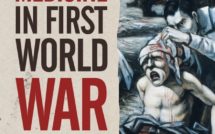

This is part of our Campus Spotlight on the University of North Carolina at Chapel Hill.
This course is taught in an Anthropology department and largely draws students concentrating in medical anthropology. Michele Rivkin-Fish developed the course with several overarching objectives. Focusing on reproductive issues, sexuality, and the post-Soviet crisis of premature male mortality, the course explores the ways in which the collapse of state socialism impacted people’s well-being and dramatically shifted the challenges and opportunities they faced on a daily basis. Aimed at upper-level undergraduate students with little or no knowledge of the former Soviet Union and Cold War-era Eastern bloc, it also includes an introductory unit examining the historical, political, and economic characteristics of state socialism. Bringing together ethnography, literature, film, and health-related texts, the course illustrates how effectively addressing health and medical problems necessitates understanding local history, culture, and gender relations.
When the Soviet Union collapsed in 1991, observers around the world celebrated the advent of freedom and democracy after decades of communist rule. Yet in the immediate aftermath of these broad-based reforms, shocking deteriorations in public health registered across Eastern Europe and the former Soviet republics. Sexually transmitted diseases skyrocketed, the birth rate plummeted and of those children who were born in Russia, 30% were born out-of-wedlock. Additionally, Russian men’s life expectancy declined to only 57 years in the late 1990s. These are just a few of the gendered and health-related problems that people in this region face.
What can an anthropological analysis of public health and gender reveal about the complex processes of building new cultural and political-economic systems based on market economics? Scores of analyses have been published to explain the post-Soviet health crisis, and numerous international and domestic projects have been implemented to try to reverse its various aspects. At stake in these efforts are representations of the socialist system and process of democratization, as well as the political-economic interests of a variety of competing actors. Critical analysis of the ideas, values, and assumptions underlying these explanations and projects is necessary for a thorough understanding of global health in the 21st century.
This course examines the experiences of post-socialist countries as a means of understanding the relationship between political-economic, social, and cultural change, on the one hand, and public health and gender relations, on the other. Our focus is on Russia, and we will also examine a case study from Poland. The course aims to help students achieve two main goals: 1) to understand the ways health and gender are affected by processes of political and cultural changes (specifically regarding changes accompanying shifts from state socialism to market-based society); and 2) to explore the specific insights gained from anthropological perspectives on health and gender in the aftermath of state socialism. The course is organized around 4 overarching themes: 1) An introductory examination of Soviet society and its unraveling from the end of the 1980s-1990s, 2) Sexuality; 3) Reproduction; and 4) Masculinities and Male Mortality.
There are 3 required books for the course.
- Tuller, David. 1996 Cracks in the Iron Closet: Travels in Gay and Lesbian Russia. Faber and Faber.
- Mishtal, Joanna. 2015. The Politics of Morality: The Church, the State, and Reproductive Rights in Postsocialist Poland. Athens: Ohio University Press.
- Parsons, Michelle. 2014. Dying Unneeded: The Cultural Context of the Russian Mortality Crisis. Nashville, TN: Vanderbilt University Press.
In addition, articles will be available on our class sakai site.
Course Requirements:
1) Consistent attendance and active participation is required. Thoughtful participation based on the course readings counts for 10% of your grade.
2) A Take-Home Exam (with in-class history time-line component), due Friday 2/5 @ 4:00 pm: 25% of your grade.
3) 3 Group-Based Policy Briefs on Class Themes, maximum 1000 words each (please format double-spaced, 12 pt font). 10% each, total of 30% (Due: Thursdays 2/25, 3/31, 4/21)
4) Group Oral Presentation on Policy Brief: 5% of your grade (details below).
5) A final research paper of 5 pages, double-spaced, 12 pt font; 30% of your grade, due Friday, April 29 @ 4:00pm.
Instructions for Your Group Policy Briefs
Groups will write 3 policy briefs analyzing the issues raised by each of our three themes (sexuality, reproduction, masculinities/male mortality), and will make an oral presentation to the class about one of their policy briefs.
Apolicy brief summarizes the complexities of an issue, and explains why and how this research is relevant for a particular constituency beyond other anthropologists. In other words, policy briefs are vehicles for the translation of insights from one community of discourse to another. Our goal in composing policy briefs is to find ways that anthropological types of knowledge may be used to enrich public debate by introducing viewpoints and insights not usually recognized.
Students will identify the particular constituency(ies) interested in the topic, summarize the study’s relevance for these constituencies, and translate the anthropological findings into a policy brief aimed at enriching public debate. The paper will also creatively imagine ways that the policy brief could be presented in a public forum (e.g., as a workshop for relevant constituencies, as a platform for a social change campaign, as a film, etc.)
To prepare for your policy brief, you will need to do several things:
- Choose a set of findings from our ethnography to highlight for discussion.
- Identify a constituency whom you want to inform about these findings (who is your audience for the policy brief?)
- Explain why these findings are significant for this constituency: what assumptions does the author overturn, what new ways of thinking does s/he introduce, what problems or paradoxes does the book expose?
Once you’ve done this preparatory work, the Policy Brief should be organized as follows, with subheadings that identify these subsections and double-spaced, in 12 pt font:
- Title of the Policy Brief that communicates the specific issue at stake and identifies the audience for the policy brief
- An introductory statement that explains to the reader that that the brief will present findings from an anthropological study undertaken by (author’s name) as presented in (title of book and year of publication). Other basic information such as the site of research, communit(ies) studied, methods undertaken, etc., should also be included.
- Summary of the key findings of the research the policy brief, described with sufficient theoretical and ethnographic detail to make sense to a reader unfamiliar with the study being described (250 words).
- Explanation of why these findings are significant to the given constituency: what issues, problems, concerns, or potential solutions does the book raise that this constituency should consider in their work or lives? (approximately 200 words).
- Works Cited
Group Participation Evaluation: groups will remain intact for the duration of the semester. The professor will be open to student feedback on group composition (concerns about groups are best conveyed to me in private, preferably during office hours). At the conclusion of the semester, students will fill out a confidential evaluation of their own participation and that of their fellow group members. These evaluations will be taken into consideration in the evaluation of student participation.
Instructions for Your Individual Research Paper:
Research Paper Objectives: This is your opportunity to explore an area of personal interest regarding gender and health after socialism. You will undertake preliminary literature review and analysis on a topic of your choice that is broadly related to one of the 3 themes of our class (sexuality, reproduction, and masculinity/men’s health). You must identify and analyze two new scholarly articles and compare them to at least two of our class readings for your research paper.
Please organize your research paper in the following way:
1) Introduction: Describe the topic both empirically and theoretically and justify its importance.
2) Research analysis: summarize the findings of the articles you’ve found, discussing their disciplinary approaches (theory and method), and the broader debates they are partaking in. Be sure to frame your analysis as a review of the literature, a study of each author’s approach and argument.
3) Compare and contrast the arguments of these authors with the arguments/approaches of readings we have done in class. Refer specifically to at least two of our readings.
4) Develop an anthropological critique of the issue, either by raising concerns about the assumptions and blind spots of the existing literature, and/or by re-conceptualizing how an anthropological study of the topic might proceed.
Course Schedule
Introduction T 1/12- TH 1/14: Socialism in theory and practice
Marx, Karl, and Friedrich Engels, 1848 excerpts from “The Communist Manifesto” in The Russia Reader, ed. Adele Barker and Bruce Grant, 2010, pp. 305-309.
Gorbachev, Mikhail. 1990. Excerpts from “The Most Responsible Phase of Perestroika” in The Russia Reader, ed. Adele Barker and Bruce Grant, 2010, pp.667-672.
Dallin, Alexander. 1992. Excerpts from “Causes of the Collapse of the USSR” in The Russia Reader, ed. Adele Barker and Bruce Grant, 2010, pp.673-683.
Wk 1 T 1/19- TH 1/21
Introductory Departures: Conceptualizing Gender, Health and the Promises of State Socialism
Kollontai, Aleksandra, 1923. excerpts from “Make Way for Winged Eros” in The Russia Reader, pp.351-361.
Baranskaya, Natalya. 1974.”A Week Like Any Other Week,” The Massachusetts Review pp. 657-703.
Wk 2 T 1/26 -TH 1/28
Introductory Departures: Representing Socialism and its Aftermath
Burawoy, Michael, Pavel Krotov, and Tatiana Lytkina, 2000. “Involution and Destitution in Capitalist Russia” Ethnography 1(1):43-65.
Ries, Nancy. 1997. “Our Fairy-Tale Life” in The Russia Reader, pp.684-691.
Thurs: – screen in class “My Perestroika”** (87 min)
Recommended: Taylor, Jeffrey. 2001. “Russia Is Finished: The unstoppable descent of a once great power into social catastrophe and strategic irrelevance” The Atlantic Monthly May. http://www.theatlantic.com/magazine/archive/2001/05/russia-is-finished/302220/
Wk 3 T 2/2- TH 2/4
Tuesday, February 2: Discussion of films, “My Perestroika” and “Russian Feminism: Twenty Years Forward”
Take Home Exam Distributed Tuesday, 2/2.
Thursday:Review of Class Material to Date; In-Class History Time-Line Component of Exam (15 min).
Take-Home Exam due: Friday 2/5 4:00 pm, hard copies in Prof. R-F’s mailbox, 301 Alumni.
Theme 1: Sexuality
Wk 4 T 2/9 and TH 2/11 Sexuality, Selfhood, and Authentic Relationships in the Shadow of Socialism
Tuller, David. Cracks in the Iron Closet, pp. 3-100.
Wk 5 T 2/16 – TH 2/18 Sexual Identity, Culture, & Global Politics for Equality
Tuller, Cracks in the Iron Closet pp. 101-154; 226- 275;
Rivkin-Fish, Michele and Cassandra Hartblay, 2014. “Global LGBT Activism and the Resurgence of Cold War Hostilities: A Call for Examining Russian Queer Experience and Strategies” Brown Journal of World Affairs Vol. XXI, Issue 1, pp. 95-111.
Wk 6 T 2/23- TH 2/25
T: Library Instruction: Preparation for Research Paper
TH: Group Policy Briefs & Presentations due
Theme 2: Anthropological Approaches to Reproduction After Socialism
Wk 7 T 3/1 & TH 3/3
Pronatalist Authoritarianism and its Consequences
Baban, Adriana “Women’s Sexuality and Reproductive Behavior in Post-Ceausescu Romania: A Psychological Approach” in Reproducing Gender, Susan Gal and Gail Kligman, eds. Princeton: Princeton University Press, pp.225-256.
Rivkin-Fish, Michele. 2006 “From ‘Demographic Crisis’ to a ‘Dying Nation’: The Politics of Language and Reproduction in Russia” in Gender and Nation in Russia, Helena Goscilo and Andrea Lanoux, eds. University of Northern Illinois Press, pp.151-173.
Film: 4 months, 3 weeks and 2 days, 113 minutes.
65-DVD7005 c. 2
Wk 8 T 3/8 – TH 3/10 Reproductive Politics and Post-Socialist Moral Revival: The Case of Poland
Mishtal, Joanna. 2015. The Politics of Morality, pp. 1-110.
MARCH 15-17- SPRING BREAK
Wk 9 T 3/22- TH 3/24
Mishtal, Joanna. 2015. The Politics of Morality, pp.111-200.
Wk 10 T 3/29- TH 3/31
Tuesday: Discussion & Policy Brief Workshop on Reproduction
Thursday: Group Policy Briefs and Presentations Due
Theme 3 Post-Soviet Masculinities and Russia’s Male Mortality Crisis
Wk 11 T 4/5-TH 4/7
Watson, Peggy 1995. “Explaining Rising Mortality Among Men in Eastern Europe” Social Science and Medicine 41(7): 923-934.
Wk 12 T 4/12- TH 4/14
Parsons, Dying Unneeded, pp.1-100 (introduction, chapters 1-4)
Wk 13 T 4/19- TH 4/21
Parsons, Dying Unneeded, pp. 101-178 (chapters 5-8, conclusion)
Tuesday: discussion
TH- Group Policy Briefs and Presentations Due
Wk 14 4/26
Conclusion of Course & Discussion
Research Papers Due 4/29 at 4:00pm
Tips for Success (in this – and any—course):
With effort and commitment, you can achieve a great deal! Effective studying, preparing, planning, and writing, however, are not things that people ‘naturally’ know how to do—they are learned skills that, for the most successful people, become habits. One of my goals for you this semester is to assist you in developing these skills and habits. To that end, there are several things you can do to pursue high levels of learning and achievement.
1) Reading—an activity that should include Writing: Take notes while you read, either by quoting from the text or briefly summarizing key points of the argument. These notes will help you process and therefore understand the material. They will also serve you well as a reference when you discuss the text in class and write about it for your assignment. Reading an article or book once without taking notes is not sufficient for most people to obtain a sophisticated grasp of the text—and remember it!
2) Writing—an activity that involves Revisions: Plan to draft several versions of your papers and edit them for clarity of expression. Writing well is an important skill, and it takes a great deal of practice! Of course, correct grammar and spelling are essential: You will be marked down for poor writing and mechanics. PROOF-READ your paper before you submit it to the professor.
Once you think the paper is well-written, show it to a friend who is not in the class and has not read the text you are analyzing. This reader will be able to point out areas in your writing that are unclear and will help you see the kinds of changes that still need to be made.
Take the time and effort to make your work excellent!
3) Oral Participation – Experimenting with ideas without judgment. This class places a lot of emphasis on discussing ideas, and the professor recognizes that sometimes we are not sure what we think, or do not know how best to phrase a thought until after some less-than-perfect-version comes out of our mouths. Your oral contributions will be evaluated on the basis of effort, not on having perfectly articulated ideas and comments!
4) Clarify any ideas, concepts, or issues that are confusing for you with your professor. Don’t be embarrassed to ask questions in class—I greatly appreciate your questions as an opportunity to ensure that my students understand what I expect. If you have a question, most probably others are uncertain of the answer, too. You may also take advantage of office hours to meet with me. However, it’s always best to send an email first to let me know you’re coming, and to ensure that office hours have not been cancelled for some reason.
Suggested Resources for Research Papers
Sexual Health, HIV, Masculinities
Goodwin, et.al, 2003 “Social Representations of HIV/AIDS in Central and Eastern Europe” Social Science and Medicine. Vol. 56 No.7 pp.1373-1384.
Hyde, Sandra. 2002 “The Cultural Politics of HIV/AIDS and the Chinese State in Late-Twentieth Century Yunnan,” Tsantsa (The Review of the Swiss Society of Ethnology) Winter no.7.
Hyde, Sandra. 2000 “Selling Sex and Side-stepping the State: Prostitutes, Condoms, and HIV/AIDS Prevention in Southwest China.” East Asia: An International Quarterly Vol. 18, no.4, Winter.
Farquar, Judith 2002 Appetites: Food and Sex in Post-Socialist China. Durham: Duke University Press. Chapters 4 & 5 “Writing the Self: The Romance of the Personal” and “Sexual Science: The Representation of Behavior”
Rivkin-Fish, Michele 2005. Women’s Health in Post-Soviet Russia: The Politics of Intervention. Chapter 3- sexuality education
Borenstein, Eliot 2006. “Selling Russia—Prostitution, Masculinity, and Metaphors of Nationalism after Perestroika” in Gender and National Identity in Twentieth Century Russian Culture, H. Goscilo and A. Lanoux, eds., pp.174-195
Kukhterin, Sergei “Fathers and Patriarchs in Communist and Post-Communist Russia” In Sarah Ashwin, ed. Gender, State and Society in Soviet and Post-Soviet Russia pp.71-89.
Hashamova, Yana 2006. Castrated Patriarchy, Violence, and Gender Hierarchies in Post-Soviet Film” in Gender and National Identity in Twentieth Century Russian Culture. H. Goscilo and A. Lanoux, eds. pp.196-224.
Class Marginality & Illness
Koch, Erin “Beyond Suspicion” American Ethnologist. (on TB in prisons in Post-Soviet Georgia); 2013. Free Market Tuberculosis: Managing Epidemics in Post-Soviet Georgia. Vanderbilt University Press.
Kideckel, David, 2008 Getting By in Postsocialist Romania: Labor, the Body, and Working-Class Culture. Indiana University Press.
Paxson, Margaret. 2001. “The Ghosts of War: Russia’s Sons Come Home From Chechnya” Washington Post Magazine pp. 9-12
Alcoholism, Gender, Social Relations
Segal, Boris. 1991. “Soviet Drinking Behavior” From The Drunken Society: Alcohol Abuse and Alcoholism in the Soviet Union. A Comparative Study. Hippocrene Books. Pp. 93-130.
Polowy, “Russian Women Writing Alcoholism: The Sixties to the Present” in Postcommunism and the Body Politic, Ed. Ellen E. Berry, NY: New York University Press, pp.267-295.
Pesmen, Dale 2000. “Standing Bottles, Washing Deals, and Drinking for the Soul” in Russia and Soul. Cornell University Press. Chapter 8.
Reproduction and Reproductive Politics
Kligman, Gail. 1998. The Politics of Duplicity: Controlling Reproduction in Ceausescu’s Romania. University of California Press.
Rivkin-Fish, Michele. 2005. Women’s Health in Post-Soviet Russia: The Politics of Intervention. Chapters 4-6 address doctor-patient relations in Russian reproductive health.
Michele Rivkin-Fish is an Associate Professor of Anthropology at the University of North Carolina-Chapel Hill. Her work has examined Russia’s health care reforms, debates and policies on reproduction and demography, sex education, and the daily struggles of women and men to secure well-being as privatization expands in official and unofficial ways. Her book, Women’s Health in Post-Soviet Russia: The Politics of Intervention(Indiana UP 2005) contributes to feminist and medical anthropological scholarship linking reproductive politics with transformations of the state and citizenship.
Published on June 11, 2019.




